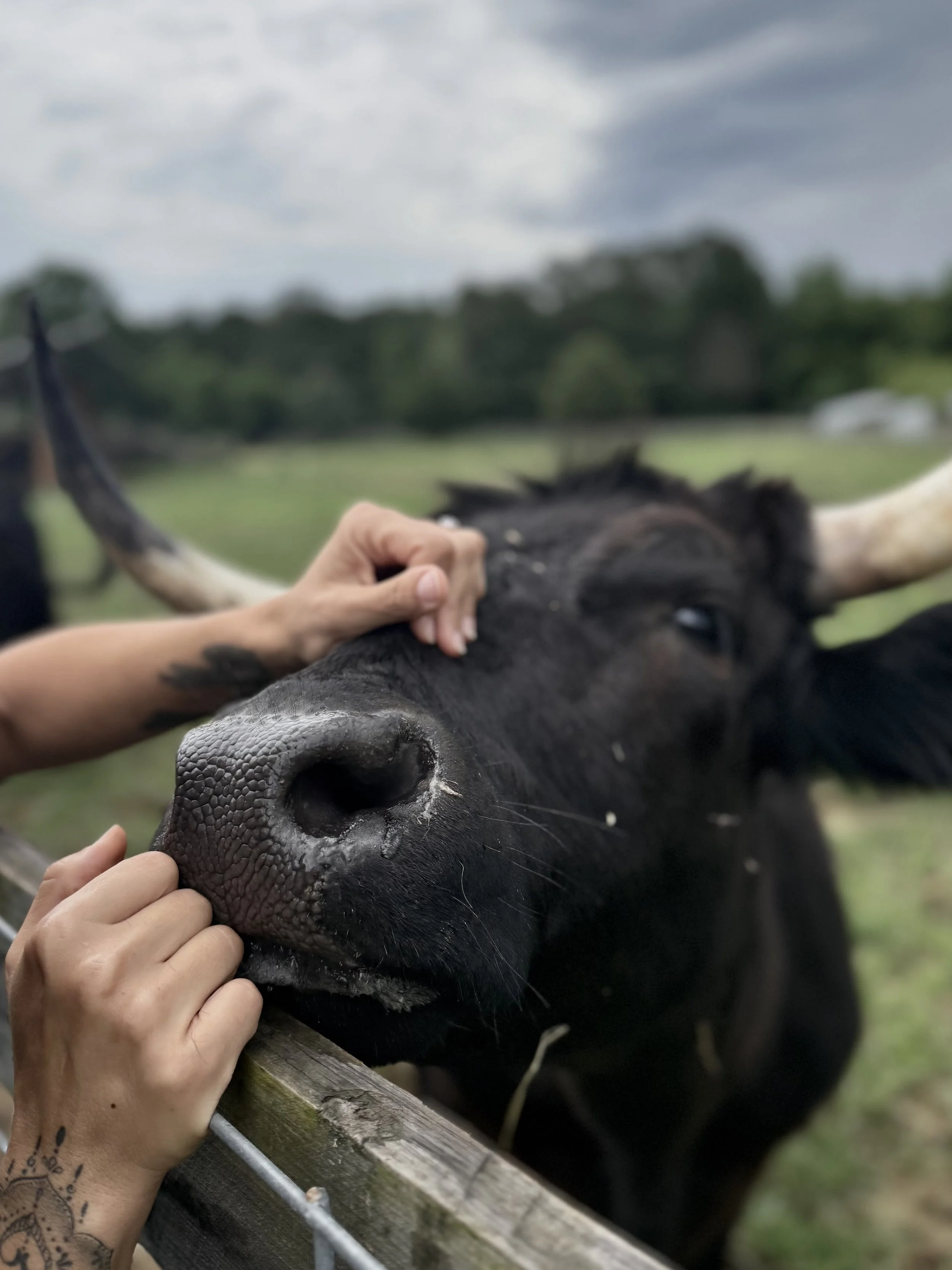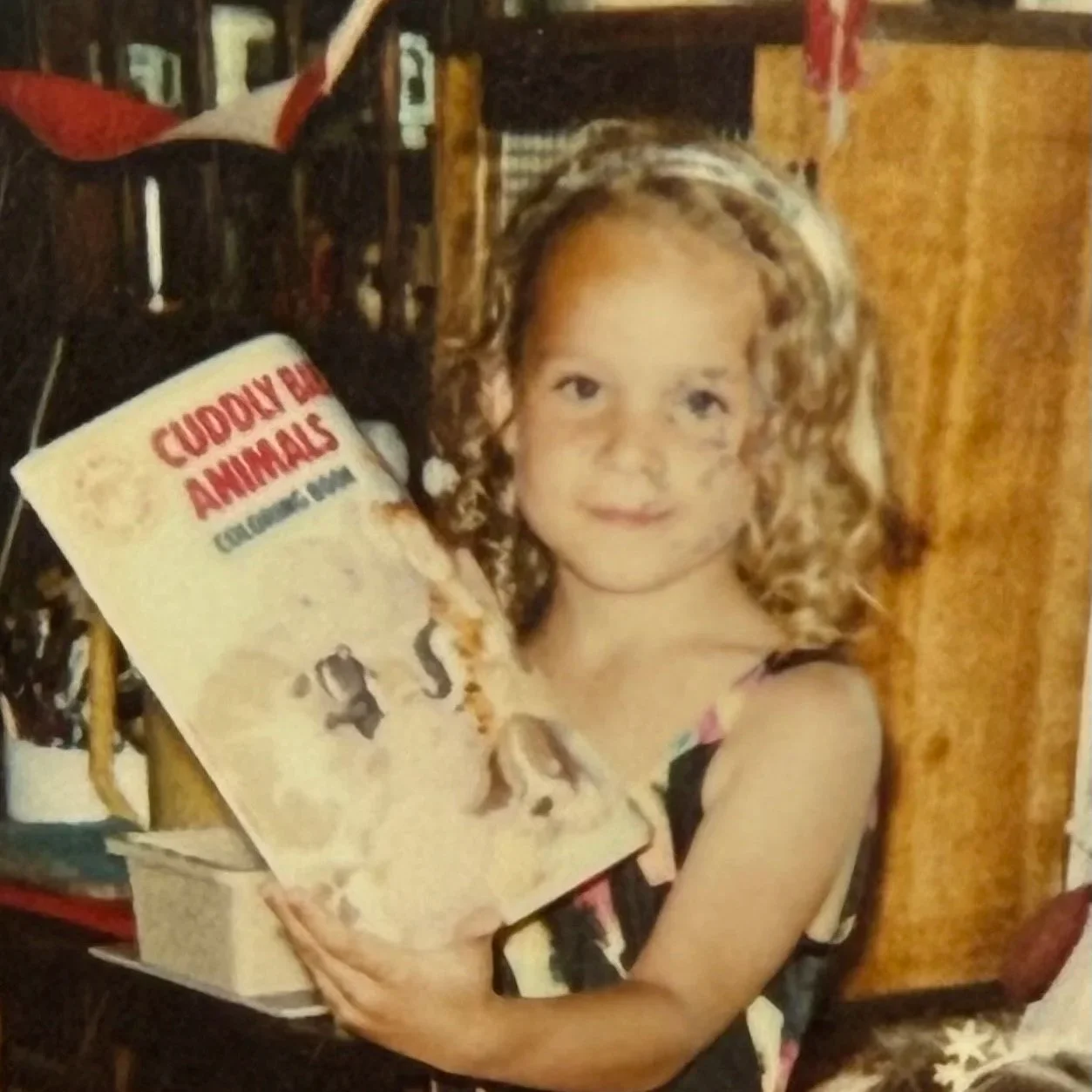Choosing Love Over Cruelty: My Journey to Veganism
Piedmont Farm Animal Refuge | May 2025
Choosing Love Over Cruelty — My Journey to Veganism
I’ve loved animals for as long as I can remember. From wanting to be near them every chance I got, to only wanting my mom to read me animal stories — The Berenstain Bears being my preferred nightly read — to watching movies like Babe and crying uncontrollably while my sister teased me for it. I knew even as a kid my connection to animals was different. I had animal coloring books, played more with my Barbie’s pony than the Barbie herself, and sometimes when I wanted to escape, I'd pretended I was a bird and could fly anywhere I wanted.
As a child, I was painfully shy. At school or during family gatherings, you’d find me hiding in a corner, thumb in my mouth, clutching my yellow silk blanket with a death grip, praying no one would speak to me. But with animals, I was talkative, funny, outgoing. I didn’t have to pretend. I was home.
My first real interactions with farmed animals were on my uncle’s small dairy farm. I’d tag along with my dad when my uncle needed more hands than his own. I didn’t see cruelty there, not the way I know it now exists. My uncle never raised a hand to a cow. His “girls” were clean, near their babies, and to my child’s mind, they seemed safe. I’d walk the length of the barn while they were milked, making friends with two cows in particular — Fred and Isabelle. They brought me joy in a time when I was already learning too much about pain.
I think my uncle carried his own weight of guilt. Eventually, he shut down the dairy and transformed the barn into an antique store. Years later, when I visited as an adult, the stalls where Fred and Isabelle once stood were filled with beautifully crafted furniture from the 1700s.
In addition to my uncle, my father and another uncle were hunters. I can still remember crawling over the bodies of deer on the way to school, tears burning in my eyes as I stepped past such majestic beings. The signs were always there — little markers of who I was meant to be — but I wasn’t ready to see them yet.
Then came the day my family took a wrong turn and ended up outside what looked like a backyard slaughterhouse. The building was rusted, equipment scattered, and in the open doorway, a sight I’ll never forget — on top of a pile of mutilated remains was the head of a cow. Black and white, just like my Fred and Isabelle.
I felt sick. I started crying. Like any child unable to process something so big, I tried to push the image out of my mind. I didn’t grow up in a city or even a town — this was rural Vermont in the early ’90s. Words like “vegan” were unheard of, and “vegetarian” was barely a concept, especially for a seven-year-old. Asking my parents to stop eating animals wasn’t going to happen.
Years later, my life had unraveled into one trauma after another. The biggest came during my second divorce — a time when I went from being a respected soldier’s wife and stay-at-home mother to feeling like I was nothing, simply because I made the decision to leave a home that had fallen apart years earlier. I found myself homeless during a global pandemic, separated from my daughter across the country. Travel was restricted. Flights were canceled. A year would pass before I could hold her again.
I am endlessly grateful my story ended with us reunited, but at the time, I didn’t know if that day would ever come. Unlike death, where there is at least an ability to grieve, I lived in a constant state of uncertainty. I couldn’t move forward. I couldn’t go back.
One night, curled up in my car, I pulled out my phone and started watching animal videos — something that had always helped me regulate my nervous system. I came across a video of a mother cow chasing after a truck as it drove away with her calf. Her cries were primal. Desperate.
And in that moment, I knew that sound. Her desperation was a mirror image of my own when my daughter was kept from me — the panic, the helplessness, the pleas no one seemed to hear.
The only other time I’d heard something that raw was when I worked at a funeral home. One day, I was tasked with wrapping a beautiful baby girl in her blanket so she could be ready for her mother’s final goodbye. Being the only woman working that day, it also became my job to comfort her. I’ve held the body of a grieving mother in my arms while she shook and made sounds you don’t know a human can make. I can assure you — all mothers speak the same language when their children are gone.
That night, I made the choice to never again be someone who contributed to their suffering.
This isn’t just about one mother cow and her baby. It’s about every calf killed for veal, every bird crammed into a cage so small she can’t open her wings, every pig who will never feel grass under his feet. It’s about the billions of animals bred into a system meant to demoralize, torture, and murder in the most heinous ways imaginable.
I’ll leave you with this — we can only claim ignorance for so long. At some point, pretending not to know becomes a choice — a test of your true morals.
-Ashley
Age 5. The moment you unwrap the perfect gift, but you’re also the shy kid at the center of attention

